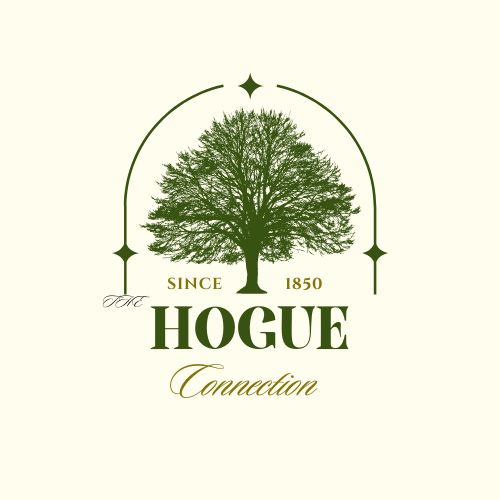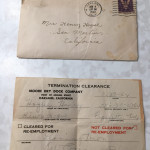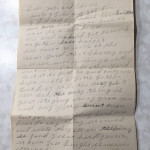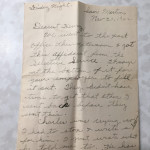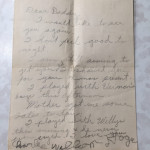As most of us know, Sunday, December 7, 1941 was the day the Empire of Japan attacked our naval base in Honolulu, Hawaii. President Franklin Roosevelt called it a “day of infamy” and asked Congress to declare war on Japan because of it. Four days later, on December 11, Adolph Hitler declared war on the United States and FDR returned with his own declaration of war. Our country was now all in against Germany and its allies. World War II was rolling.
Americans rallied to the cause; increased manpower and enormous natural resources were needed to support the war effort. Supplies, like gasoline and food, were rationed for all. Over 50 million men, aged 18 to 64, registered for the draft, with 10,000,000 inducted to serve. My grandfather, Henry Hogue was living in San Martin, CA with his wife Faye and his four year old son, Charles when war was declared. He was 27 years old and able to serve. Back to Henry and family in a bit.
One of the industries that really took off at the start of WWII was shipbuilding. England was having major problems with the Germans sinking their cargo ships in the late 1930’s, and was unable to build replacements efficiently. They were contracting many U.S. shipyards, particularly on the east coast, to fill this important need. Once war was declared, the west coast shipyards were called into action as well.
Between 1930 and 1940, America’s shipyards launched only 23 ships total. Between 1940 and 1945, 4600 ships were produced, including 2710 “Liberty” ships, with almost half of them built in shipyards in the Bay Area. Henry Kaiser had two large shipyards in Richmond, CA which were in full production. Oakland, CA was the location of another war contractor, Moore Dry Dock Company, at the foot of Adeline Street, on the Oakland Estuary across the island of Alameda. Sometime in 1942, probably in late summer or early fall, Henry and two of his brothers, Buford and Charlie, left Faye and Charles at home in San Martin to go to work for Moore Dry Dock.
If I heard about this important family event, I forgot about it. I don’t remember Grandpa ever discussing it. Luckily, I came across an exchange of letters between Henry and Faye from 14 November 1942 in a box of old photos and cards my Grandma had saved. The pictures of the letters are pretty good, considering they were in a box for 76 years. You can have a look at most of the pages in the gallery below:
I’m wondering why these Hogue brothers felt it necessary to separate from their families and move the 66 miles north to Oakland to go to work at Moore Dry Dock Co. Charlie and his wife, Alta, had a brand new son, Willis, born in July. Buford lived with his mom in a motel in San Martin, and likely did not want to leave her alone. After doing a bit of digging, I think the brothers may have been trying to get a deferment from the draft. Uncle Sam was taking everyone they could at that time. It was possible, however, to avoid the military by working in a job that supported war production. This was known as a classification of II-B. It’s possible, too, that the wages were good at this shipyard, perhaps better than what was available in Santa Clara County at the time.
The brothers most likely lived in a boarding house type of situation about two miles from the dry dock, at 950 Linden Street in Oakland, which made it easy to walk to work. In 1969, this neighborhood was razed and replaced with an affordable housing project that exists to this day. During the period the brothers worked there, Moore was working on the construction of a C2 type of all-purpose cargo ship, a C2-5-A1. It was 459 feet in length, weighed 6,555 gross tons, and could travel at 15.5 knots with good fuel economy. This ship was one of over 100 ships produced by Moore during WWII. According to Henry’s termination clearance, he was hired as a pipe fitter helper.
Although the job was pretty easy for a bunch of farmhands from Oklahoma, it didn’t last long. On 27 November, Henry left the job and returned home. It’s likely Buford and Charlie followed. I think this was a good thing: the letter exchange was a sad one indeed. Faye quoted Charles as saying “Mother, I am just so lonesome.” Henry missed his wife and “sweet little man”. Faye also mentions filling out paperwork for the Selective Service and getting Henry to have his employer sign it. On 26 Jun 1942, the government allowed married men, especially those with children, to have deferment from the draft. Things were confusing to people back then, and I’m sure that this deferment wasn’t clear until later.
So much for now. I’ve got some changes coming soon to my Hogue (and other surnames) genealogy. I’m probably going to change my main database with some new software I am investigating. I’m hoping it will allow me to have a much better web presence to encourage collaboration with more cousins! I’ll keep you posted. Thank for visiting The Hogue Connection!
